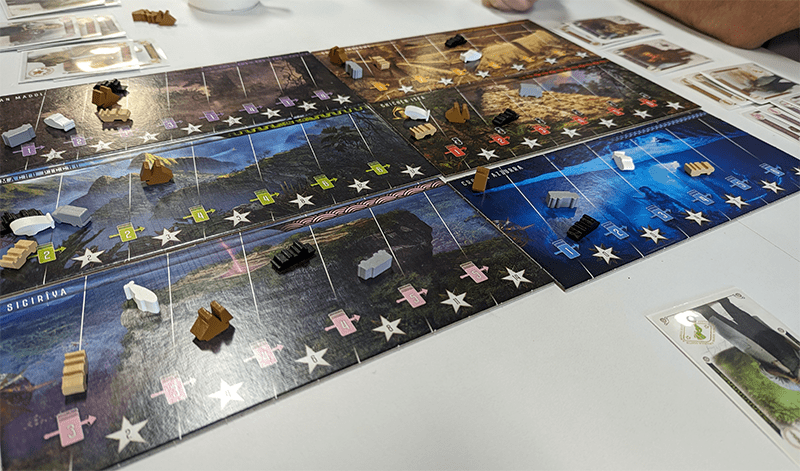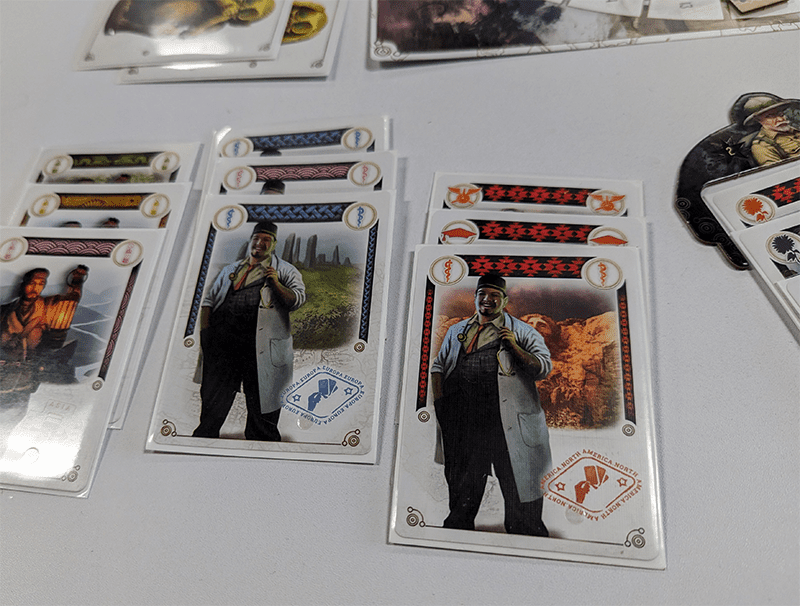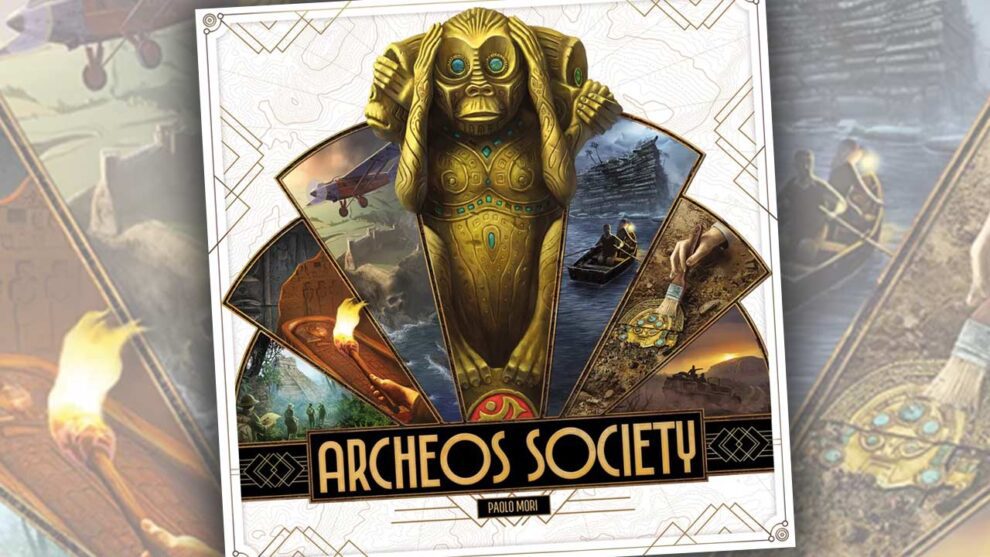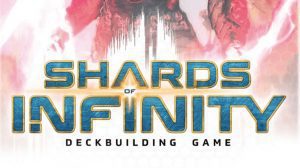Clearly 2023 is proving to be the year of the remake. This marks my 19th review so far this year, and incredibly 9 of those have been reimaginings of older games. That’s very nearly half of what I’ve covered in 2023. I don’t know quite what to make of this trend, but it is heartening to see some deserving titles gaining renewed attention. And at minimum, we’re not drowning in yet another Kickstarter dungeon crawler packed with gray plastic.
This time we find ourselves revisiting familiar territory as Archeos Society puts a new spin on Ethnos, originally published in 2017. This set collection game begins with each player holding a single card, various scoring tracks representing progress towards ancient archaeological sites, and a central display of face-up cards along with a draw deck.
On your turn, you have two options. First, you can draw a card either from the central display or from the deck. Alternatively, you can initiate an “expedition” by playing cards from your hand – these must either match in color or depict the same character. As with real expeditions, you’ll need a leader, which determines both your expedition’s power and which archaeological track you’ll advance on. Any cards not played are returned to the central display for others to claim, like leftovers after a generous Thanksgiving meal.

Simple Times
No joke, this is the entire game. All you’re doing is either drawing cards or playing them. Obviously, there is a bit more to it than that. Otherwise, it’s a straightforward game that is a good candidate for people new to board games. At least, it should, but we’ll talk about that later. We still need to talk about those archaeological tracks.
As I noted previously, the color of your expedition leader card dictates which archaeological track you advance on, moving your token one space ahead. Additionally, each track space has a specified expedition size—that is, the number of cards you must play to progress. Some tracks only require a single card, while others demand larger expeditions of three or four cards, reflecting the greater resources needed for more difficult journeys.
You are advancing on these tracks because, at the end of the round, you score the points based on the space you’re in. Most importantly, you don’t reset. The best way I can frame it is to think of it as a way to generate an income of points per round. You also score your expeditions, with the larger sizes garnering you more points, and put them back into the deck at the end of the round. What’s actually happening is that you are trying to balance your tracks to keep that income going while also having decently sized expeditions to give you those bursts of points. It’s a balancing act that isn’t easy to manage, especially with the way the round ends.
At the start of each round, the bottom half of the draw deck will have three golden monkeys shuffled in. As soon as the three monkeys show up, the round immediately ends. Seeing the first monkey might paint some expressions of concern over your friends’ faces, but nothing serious. Once that second monkey shows up, hands will shake and curse words will bounce on the table. FOMO begins to set in, and suddenly you feel the pressure, as if you just received a 24-hour notification email for that Kickstarter project you haven’t backed yet.
Go Back to Monkey
If I were going to describe the experience of Archoes Society laced with industry jargon, I would say it’s a set-collection card game with push-your-luck mechanisms. Observing the game’s systems from a bird’s eye perspective does lead to the impression that this should be easy to get into. Unfortunately, that isn’t the case.
One would expect a game featuring unique character powers to describe them in text on the cards. Instead, they are represented by cryptic icons, forcing players to repeatedly reference the back of the rulebook to decipher their meanings. This results in the rulebook being passed around the table as players struggle to explain the icons to each other, not unlike a flimsy paper menu at a questionable sushi joint. It’s an odd choice considering the original Ethnos actually printed out the full text for each power on the cards. Fortunately, this problem does go away after a handful of rounds.
This hostility towards new players doesn’t stop there. In an effort to be eco-friendly, most wooden player pieces are various shades of brown. Combined with the dark-colored archaeological boards, it can be tough to distinguish between players at times, even with the different-shaped pieces.
It’s frustrating to bring up the issues of art direction and presentation since, if it weren’t for them, I would go so far as to say that Archeos Society is the perfect alternative gateway game. It doesn’t look complex and certainly doesn’t play like an intricate game, yet there is still a sprinkle of competitive magic thrown into this cardboard cauldron.

Engaging Expeditions
The star of the show is clearly the card powers, which shake up the usual flow of play. The physician allows you to keep some unused cards in your hand instead of tossing them to reward your rivals. Students can’t move forward on the tracks, yet there are more of them in the deck, dragging out rounds but allowing for larger sets to go after. Pilots can go onto any track instead of the color they are assigned to, because who needs rules when you have planes?
Those are some of the more straightforward powers. Others introduce additional complexities. The linguist has their own scoring track—at round’s end, the player furthest ahead gains points while providing ways to move on the archaeological tracks without playing a set. The botanist rewards whoever played the largest card set that round. Finally, the curator provides end-game points for collecting sets with diverse colors.
These rulebreaking abilities also apply to the archaeological tracks. I didn’t mention it before, but these tracks are double-sided. The “advanced” side of the track provides an entirely new system of scoring or mechanics to mess around with. Chichen Itza allows you to draw cards from the deck after moving forward, while Tantallon Castle rewards you with more points if you are alone in a space.
An Updated Look
I can certainly list more examples, but the point is clear: This game can easily handle a session or ten. Each game is like opening a new exotic luxury watch and examining all the gears spinning and grinding. It’s about understanding the relationships among all these mechanisms working together and taking advantage of them better than anyone else. It is a contest worth participating in.
Archeos Society preserves the set collection mechanics of its predecessor, Ethnos, with interesting adjustments that separated it from its older brother. However, the game does struggle at times with onboarding new players, whether through obscure iconography or color palette choices that make distinguishing pieces difficult. There is fun to be had coordinating expeditions and leveraging special powers to race up the scoring tracks. It’s also easy to tolerate the game’s flawed presentation with its breakneck pace and smoothly digestible rules. Archeos Society is a solid gateway card game that stands out in an industry hungry for more easy-to-learn titles.












Add Comment